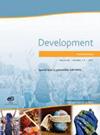Transitions in development - an interview with Maria Almuedo-Castillo.
IF 3.7
2区 生物学
Q1 DEVELOPMENTAL BIOLOGY
引用次数: 0
Abstract
Maria Almuedo-Castillo is a Junior Group Leader at the Andalusian Center for Development Biology (CABD). Maria's group studies how mechanical forces are translated into the gene regulatory signals that impact a cell. We spoke to Maria over Teams to learn more about her early-career research, her transition into being a group leader, and her insights into navigating the academic profession.
发展中的过渡——采访Maria Almuedo-Castillo。
玛丽亚-阿尔梅多-卡斯蒂略(Maria Almuedo-Castillo)是安达卢西亚发育生物学中心(CABD)的初级组长。玛丽亚的研究小组研究机械力如何转化为影响细胞的基因调控信号。我们通过团队采访了玛丽亚,进一步了解了她的早期研究、她向小组负责人的转变以及她对学术职业的见解。
本文章由计算机程序翻译,如有差异,请以英文原文为准。
求助全文
约1分钟内获得全文
求助全文
来源期刊

Development
生物-发育生物学
CiteScore
6.70
自引率
4.30%
发文量
433
审稿时长
3 months
期刊介绍:
Development’s scope covers all aspects of plant and animal development, including stem cell biology and regeneration. The single most important criterion for acceptance in Development is scientific excellence. Research papers (articles and reports) should therefore pose and test a significant hypothesis or address a significant question, and should provide novel perspectives that advance our understanding of development. We also encourage submission of papers that use computational methods or mathematical models to obtain significant new insights into developmental biology topics. Manuscripts that are descriptive in nature will be considered only when they lay important groundwork for a field and/or provide novel resources for understanding developmental processes of broad interest to the community.
Development includes a Techniques and Resources section for the publication of new methods, datasets, and other types of resources. Papers describing new techniques should include a proof-of-principle demonstration that the technique is valuable to the developmental biology community; they need not include in-depth follow-up analysis. The technique must be described in sufficient detail to be easily replicated by other investigators. Development will also consider protocol-type papers of exceptional interest to the community. We welcome submission of Resource papers, for example those reporting new databases, systems-level datasets, or genetic resources of major value to the developmental biology community. For all papers, the data or resource described must be made available to the community with minimal restrictions upon publication.
To aid navigability, Development has dedicated sections of the journal to stem cells & regeneration and to human development. The criteria for acceptance into these sections is identical to those outlined above. Authors and editors are encouraged to nominate appropriate manuscripts for inclusion in one of these sections.
 求助内容:
求助内容: 应助结果提醒方式:
应助结果提醒方式:


